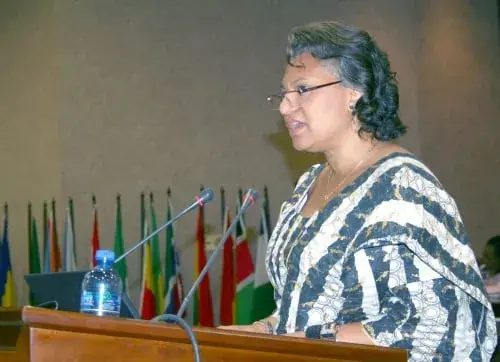Although Madagascar has introduced several initiatives aiming to stop violence against women and girls in recent years, including the UN Secretary General’s UniTE campaign, the situation remains alarming. According to the 2008/2009 Demographic and Health Survey, 32 per cent of women aged 15 to 49 believe that it is a man’s right to beat his wife or his partner in certain situations. Furthermore, only one third of Malagasy women are in a position to decide how to spend their own income.
The transitional government and its partners, including the UN system, are currently conducting a national household survey on the progress of the Millennium Development Goals. For the first time in Madagascar, data on Gender-Based Violence will be collected. This data will be imperative in order to develop and implement well-targeted Gender-Based Violence prevention and response programmes in the country.
Hanitra* is a married woman with two children who lives in Antananarivo. For years she suffered physical abuse by her husband. This is her story:
"I married my husband at the age of 25. At first he was nice to me, but after a few years he began to drink and see another woman. It was especially after drinking that he hit me. Once he even broke my front teeth. Two years ago, my husband left me for another woman. He took all our possessions and put me on the street. He currently lives in our house with his girlfriend, while I have to rent a small room. My in-laws also used to abuse me, and they still do. His new girlfriend also intimidates me. They insult me whenever they see me in the street. One time my rival even hit me. Unfortunately I have to pass by their houses every day when I take my children to school. It’s difficult.
"Fortunately, my children were not abused by their father – he beat only me. I particularly remember one serious incident. It was the Easter weekend and my husband and I had planned to go on a picnic with the kids. On Friday night I waited for him, but he never showed up. Saturday and Sunday passed, and it was only on Monday night that he came back to our house. He was completely drunk. I got to know later that he had been with his girlfriend the whole weekend. I was very angry and disappointed, and we argued. Suddenly he grabbed a pair of scissors and cut my neck. There was blood everywhere.
"The next day I went to the police station to report the incident, and I also went to the health clinic to obtain a medical certificate. My case went to court, but nevertheless there have been no repercussions for my husband so far. My husband was often drunk when he came back home at night, and this was done intentionally. Otherwise he did not dare to insult me or hit me. He especially drank a lot after he had been with his girlfriend, and he hit me when he came back home.
"I don’t want to get back with my husband, but I do not want a divorce, either. If I divorce him, I worry that I will not get anything in child support. My husband once signed a paper agreeing to pay me 50,000 Ariary ($22) per month, but so far I have not received anything.
"I went to the Centre for Counselling and Legal Assistance that is supported by UNFPA for advice, and I feel better now. Around me there are people telling me not to divorce my husband because of money. But other people advise me to divorce because the court could order him to pay child support. Nonetheless, I worry about losing all our common goods, including the house where my husband lives. In addition, I do not wish to be a divorced woman, because divorced women in Madagascar are looked down on and stigmatized in the community.
"In the fight against gender-based violence in Madagascar I think the most important factor is punishment for the perpetrators. My husband was never punished. That is really unfair.”
* Not her real name.




